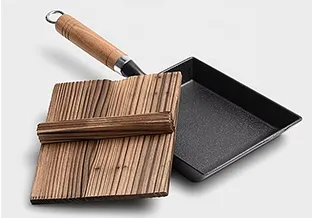
cast iron grill pan for induction cooktop
The Benefits of Using a Cast Iron Grill Pan for Induction Cooktops
When it comes to versatile cooking utensils, few can compare to the beloved cast iron grill pan. These sturdy, heat-retaining pans have been a staple in kitchens for generations, and their compatibility with modern induction cooktops has further solidified their popularity. In this article, we will delve into the advantages of using a cast iron grill pan on an induction cooktop and why it deserves a prominent place in your culinary arsenal.
Understanding Induction Cooktops
Before we explore the benefits of cast iron grill pans, let’s briefly discuss induction cooktops. Unlike traditional gas or electric cooktops that use direct heat, induction cooktops utilize electromagnetic energy to heat pots and pans directly. This method provides rapid heating, precise temperature control, and improved energy efficiency. However, it is crucial to use cookware that is compatible with induction technology, which requires ferrous (magnetic) materials — making cast iron an excellent choice.
Superior Heat Retention and Distribution
One of the standout characteristics of cast iron is its ability to retain and distribute heat evenly. This is especially important when grilling, as a consistent temperature ensures that your food cooks evenly. When you place a cast iron grill pan on an induction cooktop, the pan quickly absorbs the heat and distributes it across its surface, allowing for perfect grill marks and a deliciously seared finish on meats, vegetables, and other dishes. The even heat ensures that you don't have hot spots, which can lead to uneven cooking.
Durability and Longevity
Cast iron cookware is revered for its durability. A well-maintained cast iron grill pan can last for decades, if not a lifetime. Unlike nonstick pans that can scratch and wear down over time, cast iron develops a natural nonstick surface through seasoning. With proper care — which typically involves cleaning, drying, and applying a thin layer of oil — a cast iron grill pan will provide a reliable cooking surface for years to come. This longevity makes it a worthwhile investment for any home chef.
cast iron grill pan for induction cooktop

Versatility in Cooking
A cast iron grill pan is not just limited to grilling; its versatility extends to various cooking techniques. You can sauté, bake, and even roast in a cast iron pan. For example, you can start by grilling vegetables on the stovetop and then transfer the pan to the oven for finishing, allowing for seamless cooking transitions. The ability to use the pan on both induction cooktops and in the oven opens up a world of cooking possibilities, making it a go-to choice for a range of recipes.
Health Benefits
Cooking with a cast iron grill pan also offers some potential health benefits. Cast iron naturally promotes the retention of iron in food, which can be particularly beneficial for individuals with iron deficiencies. Additionally, because cast iron requires minimal oil when seasoned correctly, it can contribute to healthier cooking methods with less reliance on added fats.
Easy to Clean and Maintain
Cleaning a cast iron grill pan may seem daunting at first, but it's actually quite simple. After allowing the pan to cool, use hot water and a non-abrasive scrubber to remove food particles. Avoid dish soap, which can strip away the seasoning. For stubborn bits, a small amount of coarse salt can act as an effective abrasive. Once clean, drying it thoroughly and applying a thin layer of oil will keep your pan in pristine condition.
Conclusion
In conclusion, a cast iron grill pan is an exceptional addition to any kitchen, especially when used with induction cooktops. Its ability to retain heat, durability, versatility, health benefits, and ease of maintenance make it a superior choice for home cooks and professional chefs alike. If you haven't yet explored the joys of cooking with a cast iron grill pan on your induction cooktop, now is the perfect time to start. Embrace the timeless tradition of cast iron cooking and elevate your culinary creations to new heights.
-
Season Cast Iron Perfectly with GPT-4 Turbo TipsNewsAug.01,2025
-
High Quality Cast Iron Cookware - Baixiang County Zhongda MachineryNewsAug.01,2025
-
Premium Cast Iron Pan: Durable & Perfect HeatNewsAug.01,2025
-
High Quality Kitchen Durable Black Round Cast Iron Cookware Pancake Crepe Pan-Baixiang County Zhongda Machinery Manufacturing Co., Ltd.NewsAug.01,2025
-
Cast Iron Cookware - Baixiang County Zhongda Machinery | Nonstick, Heat ResistanceNewsAug.01,2025
-
High Quality Kitchen Durable Black Round Cast Iron Cookware - Baixiang County Zhongda Machinery | Non-Stick, Heat Retention, DurableNewsJul.31,2025


